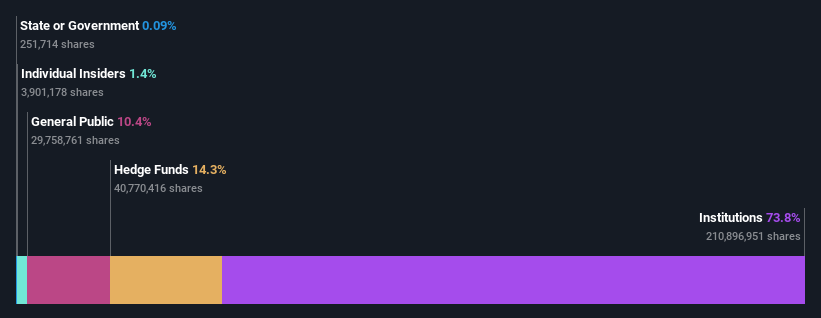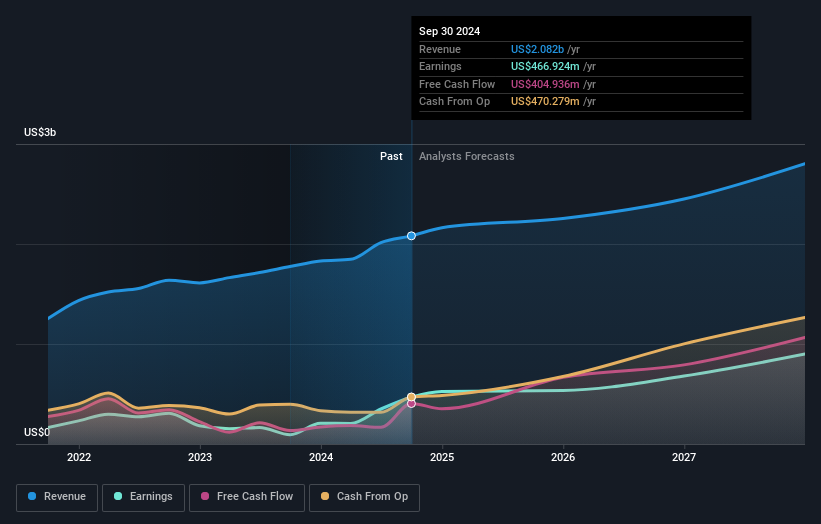- United States
- /
- Biotech
- /
- NasdaqGS:EXEL
Institutional investors control 74% of Exelixis, Inc. (NASDAQ:EXEL) and were rewarded last week after stock increased 5.9%

Key Insights
- Significantly high institutional ownership implies Exelixis' stock price is sensitive to their trading actions
- A total of 10 investors have a majority stake in the company with 50% ownership
- Insiders have been selling lately
If you want to know who really controls Exelixis, Inc. (NASDAQ:EXEL), then you'll have to look at the makeup of its share registry. The group holding the most number of shares in the company, around 74% to be precise, is institutions. Put another way, the group faces the maximum upside potential (or downside risk).
And as as result, institutional investors reaped the most rewards after the company's stock price gained 5.9% last week. The one-year return on investment is currently 64% and last week's gain would have been more than welcomed.
Let's delve deeper into each type of owner of Exelixis, beginning with the chart below.
See our latest analysis for Exelixis

What Does The Institutional Ownership Tell Us About Exelixis?
Institutional investors commonly compare their own returns to the returns of a commonly followed index. So they generally do consider buying larger companies that are included in the relevant benchmark index.
Exelixis already has institutions on the share registry. Indeed, they own a respectable stake in the company. This can indicate that the company has a certain degree of credibility in the investment community. However, it is best to be wary of relying on the supposed validation that comes with institutional investors. They too, get it wrong sometimes. When multiple institutions own a stock, there's always a risk that they are in a 'crowded trade'. When such a trade goes wrong, multiple parties may compete to sell stock fast. This risk is higher in a company without a history of growth. You can see Exelixis' historic earnings and revenue below, but keep in mind there's always more to the story.

Institutional investors own over 50% of the company, so together than can probably strongly influence board decisions. It would appear that 14% of Exelixis shares are controlled by hedge funds. That's interesting, because hedge funds can be quite active and activist. Many look for medium term catalysts that will drive the share price higher. Our data shows that BlackRock, Inc. is the largest shareholder with 11% of shares outstanding. With 10% and 8.9% of the shares outstanding respectively, The Vanguard Group, Inc. and Farallon Capital Management, L.L.C. are the second and third largest shareholders.
We also observed that the top 10 shareholders account for more than half of the share register, with a few smaller shareholders to balance the interests of the larger ones to a certain extent.
While it makes sense to study institutional ownership data for a company, it also makes sense to study analyst sentiments to know which way the wind is blowing. There are plenty of analysts covering the stock, so it might be worth seeing what they are forecasting, too.
Insider Ownership Of Exelixis
While the precise definition of an insider can be subjective, almost everyone considers board members to be insiders. Management ultimately answers to the board. However, it is not uncommon for managers to be executive board members, especially if they are a founder or the CEO.
Most consider insider ownership a positive because it can indicate the board is well aligned with other shareholders. However, on some occasions too much power is concentrated within this group.
We can see that insiders own shares in Exelixis, Inc.. It is a very large company, and board members collectively own US$145m worth of shares (at current prices). It is good to see this level of investment. You can check here to see if those insiders have been buying recently.
General Public Ownership
The general public, who are usually individual investors, hold a 10% stake in Exelixis. While this group can't necessarily call the shots, it can certainly have a real influence on how the company is run.
Next Steps:
I find it very interesting to look at who exactly owns a company. But to truly gain insight, we need to consider other information, too. Be aware that Exelixis is showing 1 warning sign in our investment analysis , you should know about...
Ultimately the future is most important. You can access this free report on analyst forecasts for the company.
NB: Figures in this article are calculated using data from the last twelve months, which refer to the 12-month period ending on the last date of the month the financial statement is dated. This may not be consistent with full year annual report figures.
Valuation is complex, but we're here to simplify it.
Discover if Exelixis might be undervalued or overvalued with our detailed analysis, featuring fair value estimates, potential risks, dividends, insider trades, and its financial condition.
Access Free AnalysisHave feedback on this article? Concerned about the content? Get in touch with us directly. Alternatively, email editorial-team (at) simplywallst.com.
This article by Simply Wall St is general in nature. We provide commentary based on historical data and analyst forecasts only using an unbiased methodology and our articles are not intended to be financial advice. It does not constitute a recommendation to buy or sell any stock, and does not take account of your objectives, or your financial situation. We aim to bring you long-term focused analysis driven by fundamental data. Note that our analysis may not factor in the latest price-sensitive company announcements or qualitative material. Simply Wall St has no position in any stocks mentioned.
About NasdaqGS:EXEL
Exelixis
An oncology company, focuses on the discovery, development, and commercialization of new medicines for difficult-to-treat cancers in the United States.
Outstanding track record with flawless balance sheet.
Similar Companies
Market Insights
Community Narratives



